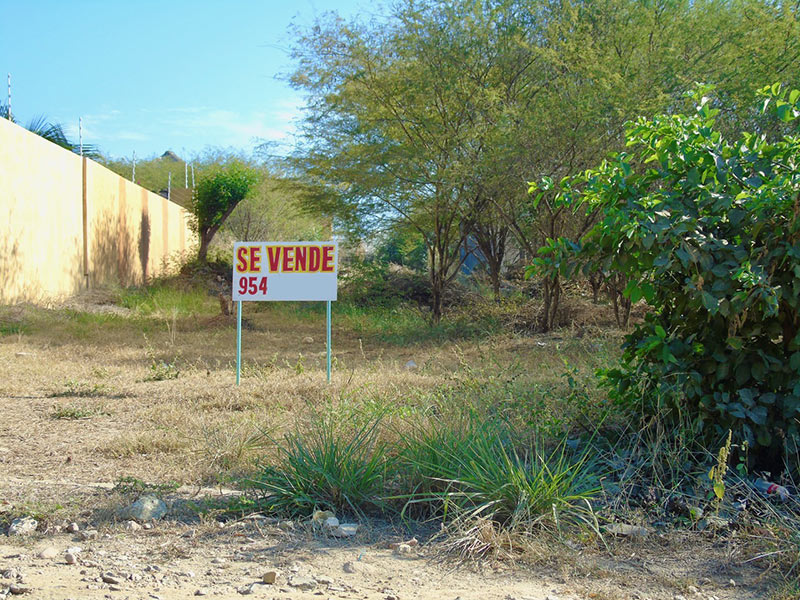
Basics of Buying Property in Puerto Escondido
NEVER BUY LAND IN COLOTEPEC (INCLUDING LA PUNTA de Zicatela and the Barra de Colotepec) without getting the acta de posesión from the seller. Some people will try to sell you property with an escritura pública (clear title). Nothing wrong with that, as long as they also have the acta. In fact, strictly speaking you can never “buy” land in Colotepec, the acta de posesión just gives you the right to occupy it.
Unlike land in Puerto Escondido that was expropriated by the federal government in 1970, including Bacocho, Rinconada and Carrizalillo, (see Vivapuerto.com #26) all the land in Colotepec is tierra comunal (land controlled by the community and not the federal government). You do not pay federal taxes on communal land, because legally the property belongs to the community. Your acta gives you the right to use your land, sell it, and to pass it on to your heirs. Property disputes on communal land are settled by the Agrarian Tribunal in Oaxaca, not by State or Federal courts. If you have an escritura, you will have to pay property taxes and the capital gains tax when you sell your property.
Foreigners cannot own communal land anywhere in Mexico, even outside the restricted zone 50 km from the coast. But the Bienes Comunales of Santa María Colotepec does issue actas de posesión to both Mexican nationals (persona física) and Mexican corporations (persona moral).
Fortunately, foreigners can get an acta de posesión if they have a fideicomiso(bank trust) in their name since banks are Mexican corporations. This is the path recommended by Eugenio Castellanos Jiménez, the president of the Bienes Comunales of Colotepec. Of course, the property must have an escritura from the land office in San Pedro Pochutla. All the properties in the gated communities of Los Naranjos, Cumaná and Rancho Neptuno have escrituras and actas de posesión, as do some properties in Brisas de Zicatela, Santa María, Tamarindos, Barra de Colotepec and elsewhere.
Another legal avenue is buying the land through a Mexican corporation. A Mexican corporation can be fully owned by foreigners with tourist visas, but it must have a Mexican administrator.
FIDEICOMISO (BANK TRUST)
Foreigners cannot own land within 50 km of the coastline – it’s in the Mexican constitution. However, a foreigner can possess land if it’s held in a bank trust (fideicomiso). With a fideicomiso you have all the rights and obligations of ownership, including the right to sell your property.
You can only get a fideicomiso on private land, i.e. property with a clear title (escritura pública). The title is drawn up by a notary and registered with the district title office (registro) and the state tax office (recaudación de rentas). Having a fideicomiso is not proof of ownership, if the property is on communal land.
EJIDO VS. COMMUNAL LAND
Both are legally referred to as social land. An ejido is a federal land grant, often on the site of a former hacienda or plantation. Communal land is territory recognized as historically belonging to a specific community. It is relatively easy for an ejido to privatize its property, but it usually requires a federal decree for communal land to be privatized in Oaxaca.
COMMUNAL LAND
The communal lands of San Pedro Mixtepec and Santa María Colotepec are but two of the 1,602 legally constituted communal and ejido lands in Oaxaca. Every three years a new president and commissioners are elected to administer the property of each bienes comunales. This commission is entirely independent of the municipality. Indeed, many municipalities include two or more bienes comunales. (There are 570 municipalities in Oaxaca.)
PRESTANOMBRE (STRAW BUYER)
The quick and easy and probably most common solution, but also the riskiest option, is to pay a Mexican national to put a property into her name. This sounds insane, and it is. The straw buyer (prestanombre) is the legal owner of the property, and if he or his heirs or estranged spouse decides to steal it, there is nothing you can do. It is against Mexican law to act as a prestanombre, and any contract you make will be non-binding. The real buyer is put in the position of a renter.










